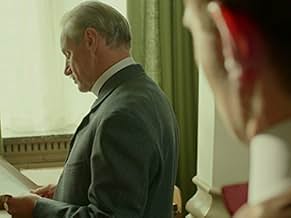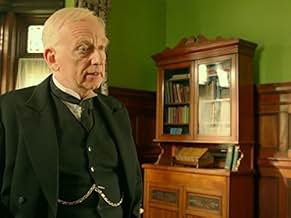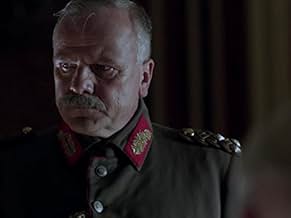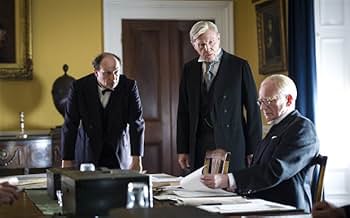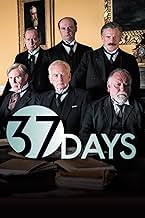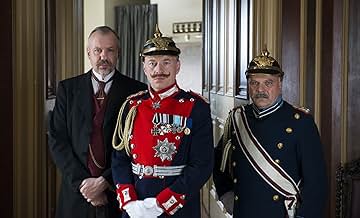CALIFICACIÓN DE IMDb
8.1/10
1.6 k
TU CALIFICACIÓN
Una miniserie que revela la historia a puerta cerrada de las últimas semanas antes del estallido de la Primera Guerra Mundial.Una miniserie que revela la historia a puerta cerrada de las últimas semanas antes del estallido de la Primera Guerra Mundial.Una miniserie que revela la historia a puerta cerrada de las últimas semanas antes del estallido de la Primera Guerra Mundial.
- Premios
- 1 nominación en total
Explorar episodios
Opiniones destacadas
The writers of this lousy propaganda have never read any history book, so all series is full of dunno what. Wilhelm wears Iron Cross before the war - it is awarded only in wartime. Similarly, Nicholas wears St George. He was awarded 4th grade only 1915. He has stripes on trousers - in Russian army it is only for generals, and Nicholas was just a Colonel. German uniforms are not correct. Edward Grey acts and speaks as football hooligan. As the rest of British statesmen. Clerks in foreign offices are half-dressed - nobody would allow to show up wearing only a vest. Etc. Generally - watch with shock and awe. Then go to dark corner and weep about decline of education and civilization.
This series shows how WW1 started. Nobody actually wanted war, but everybody thought someone else will stop it. When it started, there was no way back.
The main reason behind this mini-series was to commemorate the 100th anniversary of the outbreak of WW1, so this programme certainly had an educational purpose behind it. Unfortunately, the only saving grace of this rather clumsy attempt to tell the story was the brilliant performance of Ian McDiarmid, who despite being far too old to play Sir Edward Grey, was astonishingly convincing in the role. As has been mentioned by other reviewers, the continental characters were very poorly played, with some over the top hysterics from Kaiser Wilhelm and Von Moltke in particular -shouting and gesticulations taking the place of cogent discussion. The actors playing the Kaiser and the Tsar, in particular, looked nothing like the genuine individuals, and tried to make up for it with poor acting. There was also very little from the Austro-Hungarians, other than their ambassador coming up with poor excuses whilst being reprimanded like a naughty schoolboy by Sir Edward. The other continental characters conformed very much to national stereotypes. Finally, three hours did seem rather too much to explain the events - a single, edited two hour programme would have been much better. The first two episodes contained some periods of rather unnecessary tedium, only redeemed by the third one.
10Peadles
I am not clued in enough to say, with certainty, this BBC drama was impartial - but given how i suppose it could have gone, i think it was close enough. Even if you don't agree, you cannot fault the acting and the direction of this mini series.
Loosely told from the perspective of two foreign office clerks - one German, one British - depicts the many sad, unfortunate and ironic events in the 37 days leading to the deaths of ten million men and women around the globe during WW1.
I am of a generation of kids whose history lessons saw WW1 being completely overshadowed in favour of WW2 - so for me this was particularly interesting. It could have been poorly acted, badly directed and cheap to make and I would still have found it interesting. That it was none of those things was a great bonus! It was obvious from the outset that while they were speaking in English, the German actors were German, the Russian actors Russian and so on. Which added some authenticity to the whole thing (I am a stickler for accents!).
If you want 3 hours of world history and a good account of the bumbling old gits that ran Germany and Great Britain at the time - give this a go :)
Loosely told from the perspective of two foreign office clerks - one German, one British - depicts the many sad, unfortunate and ironic events in the 37 days leading to the deaths of ten million men and women around the globe during WW1.
I am of a generation of kids whose history lessons saw WW1 being completely overshadowed in favour of WW2 - so for me this was particularly interesting. It could have been poorly acted, badly directed and cheap to make and I would still have found it interesting. That it was none of those things was a great bonus! It was obvious from the outset that while they were speaking in English, the German actors were German, the Russian actors Russian and so on. Which added some authenticity to the whole thing (I am a stickler for accents!).
If you want 3 hours of world history and a good account of the bumbling old gits that ran Germany and Great Britain at the time - give this a go :)
37 Days is an informative, well-paced, even thrilling piece of historical drama with some superb performances from the best of the British. Its approach to the causes of the First World War is both entertaining and educational. However, there are some problems which prevent this mini-series from becoming a true classic.
The greatest problem is that almost all character who are not British are portrayed in a manner most cartoonish; from the German Kaiser to Austrian and French ambassadors all non-British characters are ridiculously over-the-top caricatures, more ludicrous than the characters in Oh! What a Lovely War. And Lovely War is a musical parody.
I can't but wonder why a production which pays so much attention to detail and is slavishly faithful to historical facts makes its characters look one-dimensional caricatures? Especially when all the British characters are portrayed as completely normal and there is true emotion and humanity in the scenes taking place in London. Is portraying the Continental characters as buffoons some kind of a statement or a lousy attempt at comedy by the British production team? In this respect 37 Days brings to mind the Nazi version of Titanic in 1943 where all the English characters are baddies and the German one saves the day. (Another point which bothers me is the portrayal of the last Russian tsar Nicholas II. In this he is shown as an aggressive and stern military man rather than the sensitive and simple family man portrayed in every single film and history book concerning this topic. Could it be that the production team has confused Nicholas II with his father Alexander III because the character in 37 Days truly looks and acts like Alexander?)
Nevertheless, 37 Days is a fresh take on the First World War and includes some wonderful performances. Absolutely phenomenal is Ian McDiarmid as Sir Edward Grey who truly brings realism and humanity to the production which is in places in a danger of becoming a parody because of its cartoonish cavalcade of Continental caricatures or a boring history lesson since all the scenes take place in cabinet meeting rooms. Other great performances are delivered by Bill Paterson, Sinéad Cusack, Nicholas Farrell and Tim Pigott-Smith, to name a few.
The greatest problem is that almost all character who are not British are portrayed in a manner most cartoonish; from the German Kaiser to Austrian and French ambassadors all non-British characters are ridiculously over-the-top caricatures, more ludicrous than the characters in Oh! What a Lovely War. And Lovely War is a musical parody.
I can't but wonder why a production which pays so much attention to detail and is slavishly faithful to historical facts makes its characters look one-dimensional caricatures? Especially when all the British characters are portrayed as completely normal and there is true emotion and humanity in the scenes taking place in London. Is portraying the Continental characters as buffoons some kind of a statement or a lousy attempt at comedy by the British production team? In this respect 37 Days brings to mind the Nazi version of Titanic in 1943 where all the English characters are baddies and the German one saves the day. (Another point which bothers me is the portrayal of the last Russian tsar Nicholas II. In this he is shown as an aggressive and stern military man rather than the sensitive and simple family man portrayed in every single film and history book concerning this topic. Could it be that the production team has confused Nicholas II with his father Alexander III because the character in 37 Days truly looks and acts like Alexander?)
Nevertheless, 37 Days is a fresh take on the First World War and includes some wonderful performances. Absolutely phenomenal is Ian McDiarmid as Sir Edward Grey who truly brings realism and humanity to the production which is in places in a danger of becoming a parody because of its cartoonish cavalcade of Continental caricatures or a boring history lesson since all the scenes take place in cabinet meeting rooms. Other great performances are delivered by Bill Paterson, Sinéad Cusack, Nicholas Farrell and Tim Pigott-Smith, to name a few.
¿Sabías que…?
- TriviaThe music received an RTS nomination for Andrew Simon McAllister.
- ErroresSir Edward Grey was only 52 years old at the time of the events depicted in the series, yet is played by a 70 year old Ian McDiarmid.
- ConexionesFeatured in The Wright Stuff: Episode #19.45 (2014)
Selecciones populares
Inicia sesión para calificar y agrega a la lista de videos para obtener recomendaciones personalizadas
- How many seasons does 37 Days have?Con tecnología de Alexa
Detalles
- Tiempo de ejecución1 hora
- Color
- Relación de aspecto
- 1.78 : 1
Contribuir a esta página
Sugiere una edición o agrega el contenido que falta

Principales brechas de datos
By what name was 37 días (2014) officially released in India in English?
Responda
